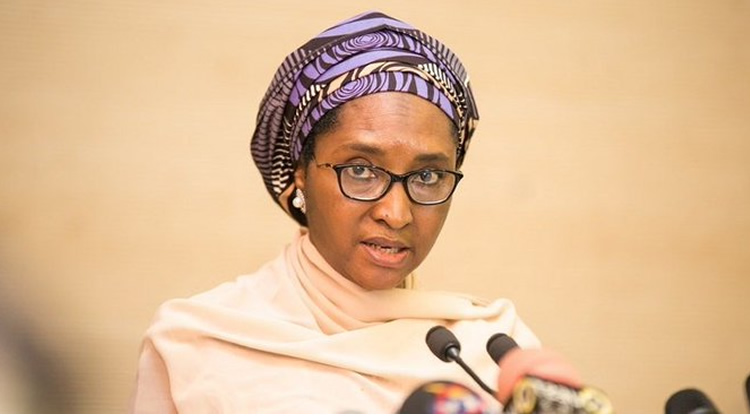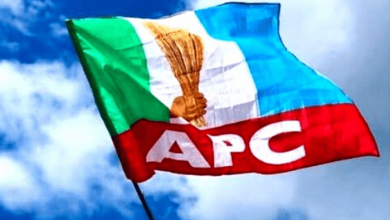
The Federal Government borrowed an additional N1.15 trillion between January and August of 2022, according to information obtained by The PUNCH.Information Guide Nigeria
A document of the Minister of Finance, Budget and National Planning’s public presentation of the projected budget for 2023 revealed that the Federal Government intended to borrow N6.10tn in 2022.
👉 Relocate to Canada Today!
Live, Study and Work in Canada. No Payment is Required! Hurry Now click here to Apply >> Immigrate to CanadaThe Federal Government projected to receive N3.53 trillion from domestic creditors and N2.57 trillion from foreign creditors, according to a breakdown.
The document estimates that the Federal Government will borrow N4.07 trillion between January and August of 2022.
However, the Federal Government generated N5.33 trillion in debt during the period under review, which is N1.15 trillion more than the budgeted debt of N4.07 trillion.
The Federal Government borrowed N4.82 trillion from domestic creditors and N510.21 billion from foreign creditors, according to a further breakdown.
The Federal Government’s borrowings from the Central Bank of Nigeria through the Ways and Means Advances are included in the debt from domestic creditors.
Ways and Means Advances are financial facilities via which the CBN finances government budget shortages.
The PUNCH recently reported that between January and August 2022, the Federal Government borrowed a total of N4.61tn from the Central Bank of Nigeria through Ways and Means Advances.
This indicates that the vast majority of the Federal Government’s domestic debt is owed to the CBN.
👉 Relocate to Canada Today!
Live, Study and Work in Canada. No Payment is Required! Hurry Now click here to Apply >> Immigrate to CanadaOn its website, the CBN warns that the Federal Government’s borrowing from it through the Ways and Means Advances could have a negative impact on the bank’s monetary policy, to the detriment of domestic prices and exchange rates.JAMB Result
Other Top Stories:
- Petroleum Marketers Threaten To Withdraw Services Over Price Hike
- (JUST IN) $1.3m Fraud: AA Zaura Sick, Can’t Stand Trial – Counsel
- 70 people arrested for violating sanitation law
- BREAKING: Two abducted MAPOLY students, others regain freedom
“The direct consequence of central banks’ financing of deficits are distortions or surges in monetary base leading to adverse effects on domestic prices and exchange rates i.e macroeconomic instability because of excess liquidity that has been injected into the economy,” it says.
In November of last year, the World Bank cautioned the Nigerian government against funding deficits by borrowing from the Central Bank of Nigeria (CBN) through the Ways and Means Advances, stating that this put pressure on the nation’s spending.
The Federal Government has continued to borrow from the CBN to fund budget shortfalls, despite warnings from experts and organisations.
In addition, the N22.07tn due to the central bank by the Federal Government is not included in the country’s total public debt, which as of June 2022 stood at N42.84tn, according to the Debt Management Office.
According to figures supplied by the DMO, the PUNCH recently revealed that the country’s debt increased by N30.72tn between July 2015 and June 2022.
According to DMO figures, Nigeria’s total debt as of 30 June 2015 was N12.12tn. By the 30th of June in 2022, the amount had increased by 253.47 percent to N42.84 trillion. The government expects to borrow N8.4tn in 2023 notwithstanding the significant increase in debt over the years.
The Federal Government’s propensity for debt has been deemed unsustainable by experts.
Due to the high cost of debt servicing, Agora Policy, an Abuja-based think tank, stated that Nigeria’s debt was unsustainable and put the government in a precarious position.
The committee encouraged the government to expand and diversify its revenue streams, rebalance its expenditures in order to spend wisely, and invest wisely.
Former National Accountants of Nigeria President Dr. Sam Nzekwe agreed that Nigeria’s debt was unsustainable.
He said, “The debt is huge. If you look at the budget, you will see that a huge sum of money is used to service debts. This is just the debt service charge. We are yet to talk about the principal.”
Instead of focusing on the debt-to-GDP ratio, he said that the debt-service-to-revenue ratio should be emphasised. Moreover, he mentioned that the nation has an income issue.
Dr. Aliyu Ilias, an economist specialising in economic development, criticised the government for its unhealthy dependence on borrowing.
In addition, he advised the government to pursue alternative revenue-generating strategies as opposed to relying so much on borrowing.
However, when she spoke before the House of Representatives Committee on Finance last week, the finance minister said that the over-borrowing was part of a deliberate strategy to guarantee that funds for capital projects were released early.
She said, “We are borrowing faster than what we had prorated. It was a conscious decision to make sure we have funds early enough to release for the implementation of capital projects.”
According to data acquired from the Budget Office of the Federation, the planned amount for recurring expenditures has climbed from N2.61 trillion in 2015 to N8.27 trillion in the proposed budget for 2023. This is an increase of N5.66tn, or 216.86%, over a six-year period, heightening concerns about the rising cost of government overheads in the context of declining revenue and a failing economy.
During the time under examination, the PUNCH investigation indicated that recurring expenses increased significantly each year.
The former president of Nigeria, Dr. Goodluck Jonathan, approved an N4.49tn budget for 2015, which includes N2.61tn in recurring expenses. The projected amount for debt servicing was N953.62 billion while capital expenditures were N557 billion. A budgetary deficit of N1.08tn was recorded.
In 2016, recurrent expenses increased by 1.53 percent, or N40 billion, to N2.65 trillion, out of a total expenditure of N6.06 trillion. The planned amount for debt servicing was N1.48tn compared to N1.59tn for capital expenditures. A budgetary deficit of N2.2tn was recorded.
In 2017, it increased by N340 billion, or 12.83 percent, to reach N2.99 trillion. Out of a total budget of N7.44tn, N2.18tn was allocated for capital expenditures, while N1.66tn was allocated for debt servicing. The fiscal deficit was N2,36 trillion.
In 2018, recurrent expenses increased by N520 billion, or 17.39 percent, bringing the total to N3.51 trillion. Out of a total expenditure of N9.12tn, N2.87tn was allocated for capital expenditures, while N2.01tn was allocated for debt payment. There was a N1.95tn budget deficit.
The next year, recurrent expenditures rose by N540bn, or 15.38 percent, to N4.05tn. Out of a total budget of N8.91tn, 2.09tn was allocated for capital expenditures, while 2.25tn was allocated for debt servicing. There was a N1.95tn budget deficit.
In 2020, out of a total expenditure of N10.59tn, 4.84tn was spent on recurring expenses. This indicates a growth of N790 billion, or 19.51 percent. The projected amount for debt servicing was N2.7bn, while capital expenditures were N2.47bn. A budgetary deficit of N2.28tn was recorded.
Nonetheless, the increase in 2020 may be attributable to the budgetary inclusion of the new national minimum wage.
In the budget for 2022, recurrent expenditures reached N6.91tn, an increase of N1.27tn, or 22.52 percent. Out of a total budget of N17.13tn, capital expenditures accounted for N5.47tn, while debt service was allocated N3.88tn. N6.26 trillion was the fiscal deficit.
Recently, President Major General Muhammadu Buhari (ret.) submitted the proposed budget for 2023 to the National Assembly.
The proposed budget for 2023 indicates that the anticipated recurrent expenditures are N8.27tn, an increase of N19.68%, or 1.36tn, compared to the previous year. Out of a total budget of N20.01tn, capital expenditures amounted to N4.93tn, while debt service was allocated N6.65tn. A budgetary deficit of N10.7tn was recorded.
The 2023 recurrent expenditures represent 41.33 percent of the nation’s total budget and are the budget’s largest item. It is also 3.78 billion Naira higher than the total expenditures for 2015.
Personnel costs accounted for N4.08 trillion of the 2023 recurrent (non-debt) expenditures; pensions, gratuities, and retiree benefits consumed N721.46 billion; and overhead expenses totaled N442.80 billion.
Throughout the years of the Buhari administration, including 2015, a total of N38.82tn has been allocated for recurring expenses. This amount exceeds the proposed N20.01 trillion total budget for the fiscal year 2023.
The rising cost of governing the nation has been bemoaned by experts. The Federal Government, through Minister of Finance Zainab Ahmed, stated in May 2021 that it was aiming to lower the high cost of governance by eliminating needless expenses, which could include compensation reductions for employees.
The increase in recurring spending in the 2023 budget, however, shows that the administration may have abandoned the plan. Economic and financial experts have expressed concern over what they deem to be significant increases in government expenditures, citing the fact that a large portion of government revenue has been allocated to recurrent expenditures as opposed to capital expenditures that drive economic growth as a cause for concern.
Prof. Chris Onalo, Registrar and Chief Executive Officer of the National Institute of Credit Administration, has emphasised the government’s need to reduce spending in order to manage its debt profile.
He said, “Everybody is concerned about the rising debt profile. And the reason it is going in that direction is because first, our recurrent expenditure is too big. When you borrow money, you don’t borrow to pay salaries. You don’t borrow to finance recurrent expenditure. That is where we have the biggest problem.
“The size of our civil service needs to be trimmed down. Some of the ministries have to be allowed to go. And then, we need a very serious audit of the Federal Government’s workforce. And until we do that, we will not be able to run the civil service system transparently. The government expenditure profile needs to be streamlined very seriously.”
Dr. Olalekan Aworinde, an associate professor of economics at Pan Atlantic University, has connected the development to growing wages and the forthcoming election.
Check Jamb Result
Check and Confirm: How much is Dollar to Naira







